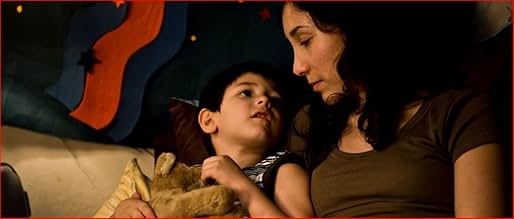VALUTAZIONE IMDb
7,5/10
5659
LA TUA VALUTAZIONE
Umay, una giovane donna di origine turca, lotta per una vita indipendente e autodeterminata in Germania contro la resistenza della sua famiglia. La sua lotta dà inizio a una dinamica che si ... Leggi tuttoUmay, una giovane donna di origine turca, lotta per una vita indipendente e autodeterminata in Germania contro la resistenza della sua famiglia. La sua lotta dà inizio a una dinamica che si traduce in una situazione di pericolo di vita.Umay, una giovane donna di origine turca, lotta per una vita indipendente e autodeterminata in Germania contro la resistenza della sua famiglia. La sua lotta dà inizio a una dinamica che si traduce in una situazione di pericolo di vita.
- Regia
- Sceneggiatura
- Star
- Premi
- 30 vittorie e 14 candidature totali
Gümeç Alpay Aslan
- Zeynep
- (as Gümec Alpay)
Recensioni in evidenza
10ssdd_000
I would like to thank everyone who created this heart breaking movie, you might question the story line if it's true story or not. I have signed up just to tell you that it's true and some women who have suffered like Umay and had experienced much more greater pain and near death experience from there own family. I'm one of them.. a 30 years old woman with 7 years old child. The difference between me and Umya is that when she found the door locked in her family place, she called the police And I can't ! the difference is she is living in country that respects humans and offer help to anyone in danger while I'm not .. I'm living in the most restricted religious country that gave men the power in everything to control a women life. I have called violence police unite and they couldn't reach me. I have been threatened by machine gun day and night. I can't take my son and run away cause nothing can be done without guardian permission. My story continues and this movie have given my strength to fight my own battle. The question will remains (am I allowed to take the decision of my son's life.. or leave my son with my family so he do experience the life of a refugee with his mom ?) Thank you again .. this movie touched my heart and I'll always remember Umay ..
The treatment of Muslim societies in the media in general and in film in particular has been subject to much agenda setting and bias. On the one hand, this has led to frequently arrogant defamation of the cultures of one fifth of humanity, on the other hand, the discourse has helped to highlight problems of Muslim integration which are often ignored under the convenient excuse of multiculturalism. What is more important: respect for other cultures living among us or concern for the plight of the individual subjected to an excessive chauvinism that allows for nothing but submission to it?
Feo Aladag's position on this is clear, but she avoids simplifications by sticking to one woman's story, and keeping that story close, while not identical, to the events that inspired it - namely the much publicized 2005 murder of Hatun Sürücü in Berlin, albeit with a surprising twist. Some may find the depictions of a regressive macho cult in German-Turkish families and social life exaggerated, especially since the acting of the supporting cast is a bit shaky at times. But as someone who has lived in a Turkish neighborhood in Berlin, I have to declare it's not. It's disturbingly close to the truth - not the distorted truth of tabloids, but the truth of people I'm close to.
The minimalistic approach of the film would usually render it a rather harmless affair, in spite of its controversial subject matter - were it not for Sibel Kekilli's outstanding performance, for which she received, among other awards, best actress at the Tribeca festival. Her heartfelt, knowing and yet forgiving gaze at the suffocating world she lives in speaks of personal experience with the role she portrays. 'When we leave' establishes her as the most exciting German actress of today.
It should be noted, by the way, that Islamic law does not condone honorary murders and considers these just as much as crimes as Western law does. Also, this practice is not exclusive to Muslim societies, but used to be widespread in Christian countries as well, where it might still occur as a justification for homicide. But these clarifications could not have been included in this film, which tells one story, and tells it well.
Feo Aladag's position on this is clear, but she avoids simplifications by sticking to one woman's story, and keeping that story close, while not identical, to the events that inspired it - namely the much publicized 2005 murder of Hatun Sürücü in Berlin, albeit with a surprising twist. Some may find the depictions of a regressive macho cult in German-Turkish families and social life exaggerated, especially since the acting of the supporting cast is a bit shaky at times. But as someone who has lived in a Turkish neighborhood in Berlin, I have to declare it's not. It's disturbingly close to the truth - not the distorted truth of tabloids, but the truth of people I'm close to.
The minimalistic approach of the film would usually render it a rather harmless affair, in spite of its controversial subject matter - were it not for Sibel Kekilli's outstanding performance, for which she received, among other awards, best actress at the Tribeca festival. Her heartfelt, knowing and yet forgiving gaze at the suffocating world she lives in speaks of personal experience with the role she portrays. 'When we leave' establishes her as the most exciting German actress of today.
It should be noted, by the way, that Islamic law does not condone honorary murders and considers these just as much as crimes as Western law does. Also, this practice is not exclusive to Muslim societies, but used to be widespread in Christian countries as well, where it might still occur as a justification for homicide. But these clarifications could not have been included in this film, which tells one story, and tells it well.
The basic plot is simple: a young lady with a crazy in-laws feds up and leaves making her a total outcast. The acting seemed a bit too dramatic and overly polished. The actors are obviously talented and have done their best, but it showed that they were trying too hard, which took away the realism I was anticipating. More than a few scenes were simply yelling and slapping which I've found quite raw. The close-ups were nice generally with beautiful faces, occasionally with oblique views. At times, when we were shown a scene with people staring at each other silently which meant that the discussion was over, I wondered if that was really the case and not if we were witnessing a zen moment. As a side note, I just have to point out that the subject of film has little to do with religion or being a "muslim". The problem is far too deep which is really a sociological phenomena rooted in dogmatic cultural upbringings and a feudal life style (mostly) of the eastern part of country where people are just a dot in the family picture rather than individuals with autonomy. You could see that nobody in the family wanted to be a part of what was going on but they could not behave otherwise -- they were slaves of their communities even thousands of miles away.
Within 30 seconds of the film's opening scene, we know we're entering a complex, and very real world.
Later we see Umay, our lead character, lying on a doctor's table and we immediately fall in love with her. There is something magical and loving about the way the camera moves around her. That's all the character development we need, but this heroine (and I mean this in a literal sense; Umay, to me, is a hero in the best sense of the word) continues to evolve and reveal amazing traits in a complicated situation that mere mortals would fold under.
This Turkish film is about familial bonds, deep and abiding love and human rights. It attempts to bridge the gap between traditional cultures and their inherent focus on family as one's primary means of survival, and post-industrial (Western) culture in which human rights and dignity are of paramount importance.
'When We Leave' reminds us westerners of what we sacrificed in the name of economic and political progress while illuminating what is now, to us, a little-understood truth: The "Old Days" weren't always "The Good old Days."
I cannot recommend this film highly enough. Sibel Kekilli's performance as Umay must be the finest role, male or female, of the entire year. And what a face! One could watch the entire film with no audible dialog and be transfixed throughout by this wonderful actor's countenance. Too bad she won't be considered for a Oscar!
Later we see Umay, our lead character, lying on a doctor's table and we immediately fall in love with her. There is something magical and loving about the way the camera moves around her. That's all the character development we need, but this heroine (and I mean this in a literal sense; Umay, to me, is a hero in the best sense of the word) continues to evolve and reveal amazing traits in a complicated situation that mere mortals would fold under.
This Turkish film is about familial bonds, deep and abiding love and human rights. It attempts to bridge the gap between traditional cultures and their inherent focus on family as one's primary means of survival, and post-industrial (Western) culture in which human rights and dignity are of paramount importance.
'When We Leave' reminds us westerners of what we sacrificed in the name of economic and political progress while illuminating what is now, to us, a little-understood truth: The "Old Days" weren't always "The Good old Days."
I cannot recommend this film highly enough. Sibel Kekilli's performance as Umay must be the finest role, male or female, of the entire year. And what a face! One could watch the entire film with no audible dialog and be transfixed throughout by this wonderful actor's countenance. Too bad she won't be considered for a Oscar!
The film she she is a victim of the traditional culture, in the cultural system of human nature, she just husband and home accessories, and is never her own most of the world are all traditional male-dominated roles if which day I hope the human progress in addition to the increasingly advanced technology and the trend of men's and women's position is equal
Lo sapevi?
- QuizGermany's official submission for the Best Foreign Language Film Award at the 83rd Annual Academy Awards in 2011.
- ConnessioniFeatures Biçak Sirti (2007)
- Colonne sonoreSO 36 - Party
Performed by Steffen Irlinger & Marian Mülle
(P) 2010 Colosseum Music Entertainment GmbH
I più visti
Accedi per valutare e creare un elenco di titoli salvati per ottenere consigli personalizzati
- How long is When We Leave?Powered by Alexa
Dettagli
- Data di uscita
- Paese di origine
- Siti ufficiali
- Lingue
- Celebre anche come
- When We Leave
- Luoghi delle riprese
- Aziende produttrici
- Vedi altri crediti dell’azienda su IMDbPro
Botteghino
- Lordo Stati Uniti e Canada
- 19.631 USD
- Fine settimana di apertura Stati Uniti e Canada
- 6018 USD
- 30 gen 2011
- Lordo in tutto il mondo
- 1.338.132 USD
- Tempo di esecuzione
- 1h 59min(119 min)
- Colore
- Mix di suoni
- Proporzioni
- 2.35 : 1
Contribuisci a questa pagina
Suggerisci una modifica o aggiungi i contenuti mancanti














